
If you’re like me, then your guitar is one of your most prized possessions. Are you doing all you can to keep it safe? This article will explain how to protect your guitar from theft and what you can do to get it back if someone steals it.
I had a guitar stolen off stage many years ago in Chicago. I wish I had followed some of these simple procedures back then, which could have made all the difference!
Millions of dollars worth of guitars are stolen each year worldwide. In most cases, knowing what to do and when to do it can prevent the tragic loss of musical equipment.
Ways To Keep Your Guitar Safe
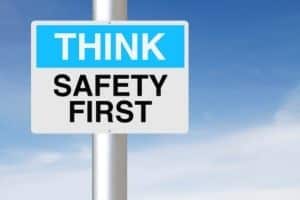
Here are the things you can do to keep your guitar safe. Some of these suggestions might seem a little “over the top” or even “paranoid,” but they pertain to a wide range of situations.
The key here is to pick the ones that apply to your particular situation and use common sense. You don’t want to spend more money protecting your guitar than the instrument is worth.
It’s usually worthwhile to implement free things that provide the most basic safeguards.
Make Your Guitar Identifiable
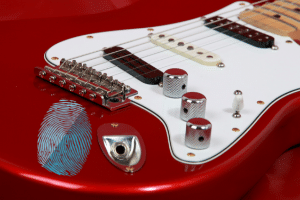
One of the easiest and most effective ways to protect your guitar is to make it uniquely identifiable. Carve your initials in an inconspicuous place like inside the tremolo cavity to use for quick recognition. UV pens are available to invisibly write your name and address on your guitar, which shows up under a UV light.
You can customize and improve the look or performance of your guitar by changing the pickguard, knobs, or pickups. Be careful with vintage instruments since replacing original parts will lower the value of the guitar.
Take pictures of every guitar you own, including the serial number and any identifiable features. Use a spreadsheet or database to keep the information organized. There are “inventory” apps that you can use to keep all your photos and written information stored together.
Be sure to print out some of the photos and bring them with you whenever you travel. Police may not accept digital photo files in the event of a theft, and you may need some copies to post in music stores, etc.
Remember to save your receipt to show as proof of purchase. Keep it in a safe place at home, not inside your guitar case.
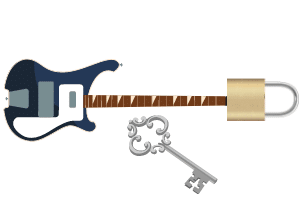
Lock Up Your Guitar
Keep your guitar locked up in a secure case or gig bag whenever safety is a concern. I have seen people hide an expensive guitar under their bed and chain it to the bed frame. For more info, see Cheap Guitar Gig Bags – 8 Best Options For Under $100!
Some people use devices that actually “clamp” around the guitar neck and cannot be removed without the key. I would advise you to be careful with these gizmos as they could damage your instrument.
Display cases are a great way to show off your collection but are not very effective in keeping it safe from intruders. It’s usually easy to break the glass or pop the case open with a crowbar. You could actually be helping the thief decide what guitar in your collection is the most valuable.
I know a studio musician who “reliced” a cheap Strat, hid a GPS tracker in the tremolo cavity, and stuck it in a display case to make it look expensive. Whenever he goes out of town, he changes the battery in the tracker. He calls it the “fail-safe” for his home security system.
If safety is not a big concern, then you can keep your guitar on a stand so that you will be motivated to play it every chance you get. For more info, see How To Stay Motivated To Learn Guitar – Top Tips For Success.
Be sure to lock up your guitar and put it somewhere out of sight if you leave town. Don’t put your guitar in a storage facility. They are not properly climate controlled and are frequently broken into.
Make Your Home Secure
It’s always a good idea to safeguard your home to protect your family and possessions from intruders and fire. Here are some things you can do to help protect your guitar from getting stolen in your home.
Get A Home Security System

Think about getting a home security system with motion detectors and high-definition video cameras. Outdoor motion-activated lighting and cameras are also a good idea.
Most thieves are reluctant to break into homes at night in a well-lit area.
Security systems monitored at a central station are much more effective than an alarm that only makes noise to scare off intruders. If you don’t have a monitored system, ask your neighbors to call the police if they hear your alarm or see any suspicious activity.
It’s worth the extra cost to have the police or fire department sent to your home in the event of a problem when you’re not there, especially if you travel a lot. You’re protecting your musical equipment and all your other valuables.
Think twice about advertising your security system by putting a big sign on your front lawn that says “protected by ADT,” or whatever. This can make people walking or driving by curious about what high-value items you might have in your home. It’s better to use stickers on your windows or doors that warn intruders if they approach your home.
If you are a serious collector or buy and sell costly guitars, look into getting a guitar vault. Rick Nielsen, the guitar player in the band Cheap trick, has a vault that safely houses hundreds of guitars!
Home security is a good idea if you leave your guitar on the couch. For more info, see The Best Couch Guitar – Relaxing, And Effortless To Play!
Protect Your Privacy
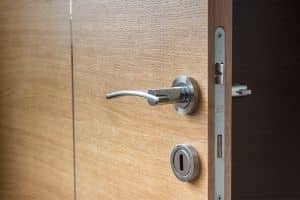
Keep your guitar in a place where it cannot be seen outside your home through windows or sliding glass doors. Find a convenient low-traffic area that is hidden from visitors or workers.
Ideally, select a private area with a door that locks, like your bedroom or a room in the basement.
If you keep your guitar on a stand, then make sure the room is secure. Put a deadbolt on the door of a room with expensive equipment like your home recording studio and install shades on the windows.
You might have great neighbors, but home break-ins in good neighborhoods are typically done by people that live elsewhere.
“Garage bands” are a lot of fun but can be risky in the wrong neighborhood. Remember, if someone sees you playing an expensive guitar in your garage, then they know where to find it when no one’s home.
Garages can be easy to break into, so don’t leave musical equipment set up when you are not using it or install a high-quality lock on your garage door.
Never let people into your home when you’re not there unless you really know and trust them. It’s generally a bad idea to let workers come and go without being unsupervised.
Beware Of Smartphone Photos

Think twice before letting people take photos of your guitar and other musical equipment, especially at your home address. You never know who they will show the photos to.
If they have “geotagging” enabled and text the photo to other people or post it on a social network, the file might contain the full address of where the guitar is located. Geotagging is enabled by default on most smartphones.
Always be careful who you show your guitar photos to, especially if you have a lot of musical equipment or a recording studio. Posting photos on social networks can be risky business if people have access to your address.
Buy Guitar Insurance
If you have a guitar worth a lot of money, like a vintage or custom-built instrument, then consider insuring it for the full appraised value. There are different types of insurance you can purchase, depending on the cost of your guitar and how you need to protect it, like during travel or against water or fire damage in your home, etc.
Your homeowner’s insurance company might be able to sell you additional coverage against theft and damage.
Some companies specialize in insuring costly guitars from theft and damage at home and during travel. One popular choice is Heritage Insurance (https://musicins.com/).
Subscribe To An Online Registry

List your guitar and other equipment with an online registry, which allows you to keep all your info in one place. You can quickly access it to give to the police and your insurance company if your guitar gets stolen.
When you create a registry account, you can add photos, serial numbers, receipts, and other specific identifying info. The police and second-hand buyers and sellers like pawnshops can have direct access to the database, which gives them a way to contact you directly.
Before signing up with a registry, check to be sure that it will not disclose the precise location of your instrument other than by city or town, publish any of your private info, or sell your data to third parties.
Here are two online registries that have proven helpful in retrieving stolen property.
PlayChecked (https://www.playchecked.com/)
PlayChecked is a free registry service specifically designed for musical instruments. If your guitar is stolen, you can alert the local community and receive an email from anyone with useful suggestions or information regarding the instrument’s potential whereabouts.
Immobilize (https://www.immobilize.net/)
You can also register your guitar on the free national registry website “immobilize,” a US database for any item. It also has a UK-specific branch (https://www.immobilise.com/).
Install Location Technology

If you own an expensive instrument, then there are some options available to help identify the owner of a guitar or even find its location. The main drawback with this technology is that special scanning or locating equipment is required to access the device.
Microchips
A microchip can be installed in the guitar and then scanned to reveal the true owner’s name and address. Gibson has installed microchips in some of its custom shop guitars, but it is not a commonly done practice.
Microchips are popular for dogs and cats, but this concept never really took off for musical instruments.
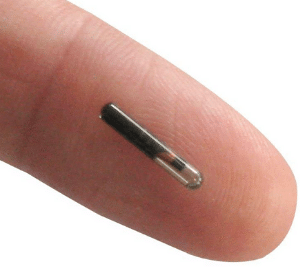
One reason is that police and pawn shops stopped using microchip technology in favor of other theft recovery modalities such as online registries.
An RFID guitar microchip marketed as “SNAGG” is no longer available.
RFID Tags
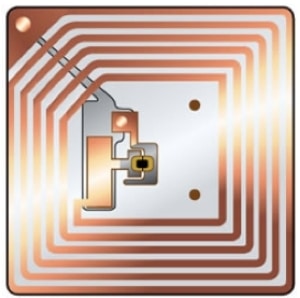
RFID (Radio Frequency ID) tags can be small, especially the passive type, making them easy to hide. They operate using ultra-high frequency (UHF) radio waves.
Passive RFID tags don’t require their own power source and can be very thin, which makes them ideal for slipping under your guitar’s pickguard. They work well in an inventory situation, but they are not suitable theft trackers since they only have a range of about 12 meters (about 40 feet).
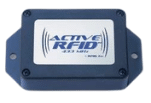
Active RFID tags are battery-powered devices that act as radio frequency beacons. They can have tracking distances of 100 meters or more (about 300 to 350 feet). They could be useful if your guitar were just stolen, like if it was taken off-stage but is still somewhere in the building.
The tag’s beacon rate can be adjusted to suit the situation. The higher the beacon rate, the more accurate the location will be, but the shorter the battery life. A 5-minute beacon rate will probably give you a 1-to-2 year battery life.
Bluetooth Trackers
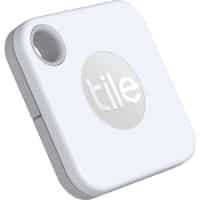
Bluetooth is short-range UHF wireless technology. It is typically limited to a transmission range of 30 to 45 feet (60 feet max), but “Tile” makes a tracker that can be hidden inside your guitar case or electric guitar, which might help you locate it.
TiIe Bluetooth trackers (https://www.thetileapp.com/en-us/) are battery-powered units that are smaller than most GPS trackers. Their “Pro” version can communicate with your smartphone from up to 400 feet away, so what makes them more useful than active RFID tags?
Tile trackers can help find your guitar using their “lost and found” network. If someone else who uses the Tile tracking system app is in proximity to your guitar, it will send the location info to your phone, regardless of how far away you are.
For example, if your guitar is at the train station or airport and another Tile tracker user walks by within range, you will get the guitar’s location on your smartphone.
This seems like a “long shot,” but Tile claims that their lost and found network finds 6 million things every day in 230 countries and territories and that 90% of tiles marked lost are eventually found
They have a Premium Protect Plan at about $8/month that will reimburse you up to $1000 per item if they can’t find it, which could be ideal if you are going on vacation or a business trip with an expensive guitar.
GPS Trackers
GPS tracking devices can be small enough to hide inside a guitar case or in places like a guitar’s tremolo cavity. Hiding a tracker under the pickguard in a routed cavity is not a good idea since the battery will typically last about 2 to 3 weeks. Systems are available that can allow you to track a guitar’s location online in real-time, but they can be costly.
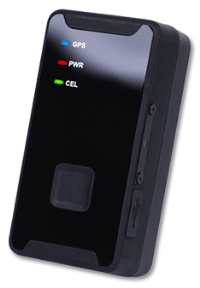
GPS trackers require a SIM (subscriber identification module) card, but this is the best technology currently available to locate your guitar if it is stolen.
EasyTracGPS (https://easytracgps.com/other-assets-equipment/guitar-gps-tracking/) makes a rechargeable GPS tracker that is ideal for guitars and other instruments. Their Geo-TraxMICRO tracker sells for $170 with a $15/month subscription plan for 60-second tracking updates.
Travel Wisely

When traveling for business, pleasure, or permanently relocating, it’s important to take steps to keep your guitar from being stolen or damaged.
Always travel with photos of your guitar that show its distinguishing features and serial number.
Take along a low-cost instrument or buy travel insurance if your guitar is expensive.
If you frequently travel to the same place, keep a second guitar at your destination with a trusted friend or band member.

Don’t Call Attention To Yourself
If you’re moving your musical equipment in a travel van or trailer, cover any windows that show the contents of your vehicle. Never park it in dark or dimly lit areas. Check to be sure that it has a good lock that is not easy to break.
Don’t decorate the outside of the vehicle with a flashy paint job, decals, or the name of your band. Keep your guitar case inconspicuous appearing so that it does not attract unnecessary attention. Remove any travel stickers or other information from the case that might indicate you play in a professional band.

Make Travel Arrangements Ahead Of Time
When traveling by commercial transportation, try to make special arrangements ahead of time for your guitar, especially if you are taking a plane.
Arrange to sit close to where your guitar is stored as a carry-on so that you can keep an eye on the overhead rack or storage closet.
Always try to take your guitar on a bus or train as a “carry-on.” Don’t check it as regular luggage to be put in a compartment where you can’t watch it.
If you are taking an airplane, try to make special arrangements to take your guitar on board or have special airport personnel safely handle it. An expensive or irreplaceable instrument can justify the cost of any additional charges.
What To Do If Your Guitar Gets Stolen

Here are some of the things you can try to get your guitar back if it gets stolen. How much action you take will depend on the cost or sentimental value of your guitar.
There are certain things you will want to have set up in advance so that you will be able to act quickly. The faster you act, the more likely you are to be successful.
Publicize And Investigate The Theft Immediately

Notify the local and state police immediately. Be sure to fill out a police report and include as many details as you can. Provide the police with photos and the serial number of your guitar.
Investigate the area where your guitar was stolen. If there are CCTV or wireless cameras inside, outside, or on nearby buildings, ask the police to access the video footage.
If your guitar was stolen from your home, then speak to your neighbors. They may have seen or heard something that can be helpful or even taken a photo on their smartphone.
Go to all the local pawn shops and music stores to make inquiries and leave information and flyers. Monitor them online if they have a website.
Monitor the social networks and create public posts on eBay, Reverb.com, Facebook, Twitter, and the local Craig’s List.
Talk to all the local musicians and entertainment establishment owners and ask them to keep an ear to the ground and an eye out for any suspicious activity. Call the local musician’s union and give them the details.

Notify Your Insurance Company
If you have insured your guitar, notify the insurance company immediately and fill out all the paperwork for the claim as soon as possible.
If you did not buy theft insurance and your guitar was stolen from your home, see if your homeowner’s policy will reimburse you a percentage of your guitar’s retail value.
If your guitar was stolen while working on the job, find out if the venue has insurance that will reimburse you for the guitar.

Find It Electronically
If your guitar is equipped with identification or location technology, like a microchip or GPS chip, then take the appropriate steps to use it to help recover your instrument.
If you locate the instrument at a non-commercial address, then ask the police to make the inquiry on your behalf or accompany you there.
Offer A Reward

If your guitar is expensive or has sentimental value, then consider offering a “no questions asked” reward for its return.
Publish the reward in the local papers and the online social networks mentioned above.
If someone contacts you to return the guitar, then arrange to meet that person in a public place and bring someone with you to make the transaction safe.
You can ask the caller to identify a unique feature on the guitar to ensure that the guitar is yours or that the call is not a prank.
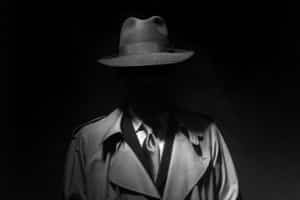
Hire A Detective
If you had a guitar of great value stolen, then consider hiring a detective to conduct a more thorough investigation. Ask the local police for suggestions and look online to find a highly rated detective agency.
Use a company that specializes in finding lost and stolen items. Do this as soon as possible, not after all else has failed to produce results.
Here is a video from “Dan’s VLOG” that talks about what you can do to keep your guitar and other musical gear safe and how you can get it back.

Final Thoughts On How To Protect Your Guitar From Theft
Keeping your guitar safe is a matter of assessing your individual situation and taking all the steps required to protect it adequately. Don’t do what isn’t necessary. Safeguarding a $250 starter Strat will be very different than a $35,000 vintage Les Paul.
You need to find the right balance between protecting your instrument and being able to enjoy it freely. If your guitar is always locked up and put away, you will be less likely to play it.
Always use common sense and treat your guitar with the respect it deserves. Don’t get in the habit of loaning out your guitar or taking unnecessary risks. If you have a “close-call” with a security flaw, then learn from your mistake and take steps to correct the problem before it happens again. It’s much easier to properly safeguard your guitar than to try to get it back.
If your guitar is stolen, then it’s important to take action immediately. The quicker you act, the more likely it is that you get it back. Have guitar photos, the serial number, proof of purchase receipt, and whatever else you need in a document or pdf file so it can be given to the police and posted in the appropriate places and online.
Utilize one of the free national registries to keep all your guitar’s information organized, in one place, and quickly available. Deploy location technology like a GPS tracker. These tools can help you find your guitar if it’s stolen or lost in transit.
Purchase home and travel insurance for a high-value guitar. Take the time to make special travel arrangements to safeguard your guitar, especially if you travel by plane.

Related Article ➡ GPS Tracker For Guitar – Is This The Best Way To Locate It?
Tell Me What You Think
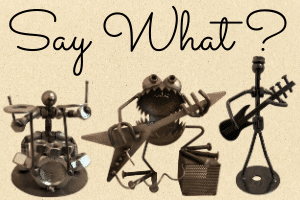
Please let me know what’s on your mind in the comment section, or if I can help you with anything.
- Have you ever had a guitar stolen?
- What did you do to get it back? Were you successful?
- Any tips to share on how to protect your guitar and how are they helpful?




My son is a professional musician and has many horror stories about his gear and guitars getting stolen. I shared this article with him, and he responded back he has taken all the actions you recommend protecting your musical gear. My son has invested tens of thousands of dollars in his guitars and amps, and there was a time when he didn’t have the funds to purchase insurance or register his instrument, and he had equipment stolen and actually lost about two months of gigs. It was a really tough time for him.
The one suggestion I hadn’t even considered is letting people take photos of gear. Holy Smoke! Geo-tagging with a smartphone photo; that’s just downright evil. I think you will find a number of new musicians who have this problem of not enough income to insure their instrument. I think when you can afford insurance for your gear, it’s the next level up as a professional musician. Your article is very informative and almost feels like a “how to” guide for new musicians and their gear. Informative and a great read.
Hi, Terry
Thank You for all your great comments!
I’m so glad you liked this article. I wrote it primarily to help musicians that are just getting started but added a little something for everyone. I hope it helps curtail the theft of musical gear.
Sorry about all the grief your son had to endure. Guitars and other instruments are so personal that it’s horrible when one gets lost or stolen. Even a really cheap guitar accumulates good memories and sentimental value over time!
The geotagging of photos on smartphones can be a major problem that not a lot of people consider. Even if you let one of your best friends take a photo of your equipment, you never really know where it could end up.
Insurance of specialty items is costly, but some companies will allow you to pay it in installments. That’s why I recommend that musicians spend less on equipment and get some basic insurance coverage until the money starts rolling in. No matter how good your home security is when you take your stuff on the road, you are putting it in harm’s way.
Frank
Frank,
You have a fantastic website! I’m so excited to read and learn more. The guitar, particularly bass, has always been a favorite.
I don’t play guitar myself (sadly), but appreciate the talents and skills of those who do play.
The tips and tricks discussed in “how to protect your guitar from theft” are excellent. I own and play a viola. My instrument is not worth as much as most guitars, but it’s mine and important to protect. I found the suggestion to subscribe to an online registry something I should seriously consider. I’d hate to have my beautiful viola stolen and never returned because I didn’t take simple and smart steps that could help police find my property.
Thanks,
Tamara
Hi, Tamara
Thank You for your comments!
It’s wonderful that you are a viola player! I really love all stringed instruments, actually all instruments.
I think that fretless instruments are more difficult to play with proper intonation than fretted ones. They really help you develop a good ear.
I’m going to make a suggestion. Please consider getting a fretless electric bass guitar. With your background, you would be a fantastic player! You would have the best of both worlds, viola and bass guitar. 😊
You should seriously consider opening an account at an online registry for additional security and peace of mind.
Best of luck with your music!
Keep on playing as often as you can,
Frank